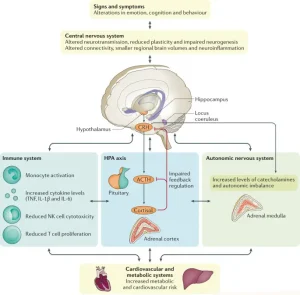Overview
Diagnosis
Diagnosing depression involves a careful evaluation by a doctor or mental health professional to understand the symptoms, rule out physical health issues, and identify the most suitable treatment plan.
The diagnosis process may include:
-
Physical exam – The doctor may check your overall health and ask questions about your medical history. Sometimes, depression can be linked to underlying medical conditions.
-
Lab tests – Blood tests such as a complete blood count (CBC) or thyroid function tests may be done to rule out other causes.
-
Psychiatric evaluation – A mental health professional will discuss your symptoms, feelings, behavior patterns, and may use questionnaires to assess your mental state.
-
DSM-5 criteria – The Diagnostic and Statistical Manual of Mental Disorders (DSM-5) is often used to confirm the diagnosis of depression.
Types of depression
Depression can vary in symptoms and severity. To better understand your condition, your doctor may specify a subtype or specifier, such as:
-
Anxious distress – Involves restlessness or excessive worry
-
Mixed features – Depression with symptoms of mania, such as high energy or rapid speech
-
Melancholic features – Severe depression marked by early morning awakening and loss of pleasure
-
Atypical features – Depression that temporarily lifts with positive events and includes increased appetite or sleep
-
Psychotic features – Depression accompanied by delusions or hallucinations
-
Catatonia – Characterized by unusual movements or immobility
-
Peripartum onset – Depression during pregnancy or after childbirth
-
Seasonal pattern – Depression linked to seasonal changes, often in winter
Other disorders that cause depressive symptoms
Several conditions can include depression as a symptom. These include:
-
Bipolar I and II disorders – Mood swings ranging from mania to depression
-
Cyclothymic disorder – Milder mood fluctuations than bipolar disorder
-
Disruptive mood dysregulation disorder – Chronic irritability and temper outbursts in children
-
Persistent depressive disorder (dysthymia) – Long-term, less severe depression
-
Premenstrual dysphoric disorder – Depression linked to hormonal changes before menstruation
-
Other depression-related disorders – Depression caused by substance use, certain medications, or medical conditions
Treatment
Treatment for depression typically includes a combination of medication and psychotherapy. In severe cases, hospitalization or structured day programs may be necessary to ensure safety and stabilization.
Medications
Antidepressant medications can help balance chemicals in the brain and improve symptoms. Common types include:
-
Selective serotonin reuptake inhibitors (SSRIs) – Such as fluoxetine, sertraline, or escitalopram
-
Serotonin-norepinephrine reuptake inhibitors (SNRIs) – Such as venlafaxine or duloxetine
-
Atypical antidepressants – Including bupropion, mirtazapine, and trazodone
-
Tricyclic antidepressants – Used when newer drugs are ineffective
-
Monoamine oxidase inhibitors (MAOIs) – Prescribed only when other treatments fail due to dietary restrictions
Finding the right medication may take time, as each person responds differently. Never stop taking antidepressants suddenly without medical guidance to avoid withdrawal effects or symptom relapse.
If you are pregnant, breastfeeding, or under 25 years old, talk with your doctor about potential risks, as antidepressants can sometimes increase suicidal thoughts in young adults.
Psychotherapy
Psychotherapy, also known as talk therapy, helps you identify thought patterns, behaviors, and emotional triggers contributing to depression. Common approaches include cognitive behavioral therapy (CBT) and interpersonal therapy (IPT).
Therapy can help you:
-
Adjust to life challenges and crises
-
Replace negative thoughts with positive ones
-
Improve relationships and communication
-
Develop problem-solving and coping skills
-
Restore control and satisfaction in daily life
Therapy can be conducted in person, online, or through guided self-help programs. Always ensure the program or therapist is qualified and reputable.
Hospital and residential treatment
Hospitalization may be necessary for severe depression, especially if there is a risk of self-harm or inability to care for oneself. Day treatment programs can also provide ongoing counseling and monitoring while allowing patients to return home daily.
Other treatment options
For individuals who do not respond to medication or therapy, brain stimulation treatments may be recommended:
-
Electroconvulsive therapy (ECT) – Uses electrical currents to influence brain chemistry and relieve severe depression
-
Transcranial magnetic stimulation (TMS) – Uses magnetic pulses to stimulate brain areas involved in mood regulation
These treatments are performed under medical supervision and may offer relief when other treatments are ineffective.
Managing depression long term
Effective depression management involves consistent treatment, lifestyle changes, and support. Regular follow-ups, exercise, adequate sleep, and connecting with supportive people can all play vital roles in recovery and maintaining mental health.
Advertisement

